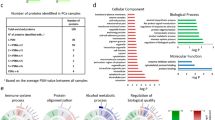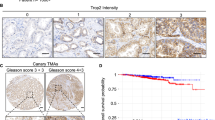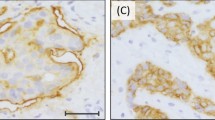Abstract
Background:
MUC1 is a membrane-bound glycoprotein that belongs to the mucin family. It is involved in cell adhesion and intracellular signaling. Aberrant expression of MUC1 has been observed in different carcinomas, including prostate cancer, where it may serve as a therapeutic target. There are no data on the prognostic value of MUC1 in metastatic prostate cancer.
Methods:
MUC1 expression was evaluated in tissue microarrays constructed from 119 nodal positive prostate cancer patients treated by radical prostatectomy and extended lymphadenectomy. MUC1 status was correlated with various tumor features and biochemical recurrence-free (bRFS), disease-specific survival (DSS) and overall survival (OS).
Results:
MUC1 expression was significantly different between primary tumors, lymph node metastases and non-neoplastic glands (scores 53.7 vs 30.1 vs 16.6; P<0.0001). High MUC1 expression in primary tumors was positively correlated with tumor volume (mean 24.4 cm3 vs 14.5 cm3; P=0.005) and T-stage (P=0.009); in lymph node metastases, high expression corresponded with a greater total size of metastases (mean 35.8 mm vs 12.7 mm; P<0.001) and a higher ratio of positive to examined lymph nodes (mean 0.22 vs 0.12; P=0.014). High MUC1 expression in lymph node metastases predicted unfavorable outcomes compared with low MUC1 expression (bRFS P=0.023, DSS and OS P⩽0.001), whereas in primary tumors, the same tendency was non-significant. In multivariate analyses, high MUC1 expression in primary tumors and lymph node metastases independently predicted early biochemical failure (P=0.046) and tumor-related death (P=0.0038), respectively.
Conclusions:
High MUC1 in either primary tumor or lymph node metastases correlates significantly with unfavorable tumor features and survival. Overexpression of MUC1 in the metastases of a subset of prostate cancer patients may have therapeutic potential.
This is a preview of subscription content, access via your institution
Access options
Subscribe to this journal
Receive 4 print issues and online access
$259.00 per year
only $64.75 per issue
Buy this article
- Purchase on Springer Link
- Instant access to full article PDF
Prices may be subject to local taxes which are calculated during checkout




Similar content being viewed by others
References
Kufe DW . Mucins in cancer: function, prognosis and therapy. Nat Rev Cancer 2009; 9: 874–885.
Zellweger T, Ninck C, Bloch M, Mirlacher M, Koivisto PA, Helin HJ et al. Expression patterns of potential therapeutic targets in prostate cancer. Int J Cancer 2005; 113: 619–628.
Arai T, Fujita K, Fujime M, Irimura T . Expression of sialylated MUC1 in prostate cancer: Relationship to clinical stage and prognosis. Int J Urol 2005; 12: 654–661.
Lapointe J, Li C, Higgins JP, van de Rijn M, Bair E, Montgomery K et al. Gene expression profiling identifies clinically relevant subtypes of prostate cancer. Proc Natl Acad Sci USA 2004; 101: 811–816.
Andrén O, Fall K, Andersson SO, Rubin MA, Bismar TA, Karlsson M et al. MUC-I gene is associated with prostate cancer death:a 20-year follow-up of a population-based study in Sweden. Br J Cancer 2007; 97: 730–734.
Cozzi PJ, Wang J, Delprado W, Perkins AC, Allen BJ, Russell PJ et al. MUC1, MUC2, MUC4, MUC5AC and MUC6 expression in the progression of prostate cancer. Clin Exp Metastasis 2005; 22: 565–573.
Kufe DW . MUC1-C oncoprotein as a target in breast cancer: activation of signaling pathways and therapeutic approaches. Oncogene 2013; 32: 1073–1081.
Raina D, Agarwal P, Lee J, Bharti A, McKnight CJ, Sharma P et al. Characterization of the MUC1-C cytoplasmic domain as a cancer target. PLoS One 2015; 10: e0135156.
Kufe D . Functional targeting of the MUC1 oncogene in human cancers. Cancer Biol Ther 2009; 8: 1197–1203.
Dreicer R, Stadler WM, Ahmann FR, Whiteside T, Bizouarne N, Acres B et al. MVA-MUC1-IL2 vaccine immunotherapy (TG4010) improves PSA doubling time in patients with prostate cancer with biochemical failure. Invest New Drugs 2009; 27: 379–386.
North SA, Graham K, Bodnar D, Venner P . A pilot study of the liposomal MUC1 vaccine BLP25 in prostate specific antigen failures after radical prostatectomy. J Urol 2006; 176: 91–95.
Rajabi H, Ahmad R, Jin C, Joshi MD, Guha M, Alam M et al. MUC1-C oncoprotein confers androgen-independent growth of human prostate cancer cells. Prostate 2012; 72: 1659–1668.
Studer UE, Whelan P, Albrecht W, Casselman J, de Reijke T, Hauri D et al. Immediate or deferred androgen deprivation for patients with prostate cancer not suitable for local treatment with curative intent: European Organisation for Research and Treatment of Cancer (EORTC) Trial 30891. J Clin Oncol 2006; 24: 1868–1876.
Heidenreich A, Bastian PJ, Bellmunt J, Bolla M, Joniau S, van der Kwast T et al. EAU guidelines on prostate cancer. Part II: treatment of advanced, relapsing, and castration-resistant prostate cancer. Eur. Urol. 2014; 65: 467–479.
Fleischmann A, Rocha C, Saxer-Sekulic N, Zlobec I, Sauter G, Thalmann GN . High-level cytoplasmic cyclin D1 expression in lymph node metastases from prostate cancer independently predicts early biochemical failure and death in surgically treated patients. Histopathology 2011; 58: 781–789.
Sobin L, Gospodarowicz MK, Wittekind Ch . TNM Classification of Malignant Tumors. Wiley-Blackwell: Chichester, UK, 2010.
Eble JN, Sauter G, Epstein JI, Sesterhenn IA . Pathology and Genetics of Tumours of the Urinary System and Male Genital Organs. IARC Press: Lyon, France, 2004.
Fleischmann A, Schobinger S, Markwalder R, Schumacher M, Burkhard F, Thalmann GN et al. Prognostic factors in lymph node metastases of prostatic cancer patients: the size of the metastases but not extranodal extension independently predicts survival. Histopathology 2008; 53: 468–475.
Fleischmann A, Schobinger S, Schumacher M, Thalmann GN, Studer UE . Survival in surgically treated, nodal positive prostate cancer patients is predicted by histopathological characteristics of the primary tumor and its lymph node metastases. Prostate 2009; 69: 352–362.
Fleischmann A, Rocha C, Schobinger S, Seiler R, Wiese B, Thalmann GN . Androgen receptors are differentially expressed in Gleason patterns of prostate cancer and down-regulated in matched lymph node metastases. Prostate 2011; 71: 453–460.
Fleischmann A, Saramäki OR, Zlobec I, Rotzer D, Genitsch V, Seiler R et al. Prevalence and prognostic significance of TMPRSS2-ERG gene fusion in lymph node positive prostate cancers. Prostate 2014; 74: 1647–1654.
Søreide K . Receiver-operating characteristic curve analysis in diagnostic, prognostic and predictive biomarker research. J Clin Pathol 2008; 62: 1–5.
O'Connor JC, Julian J, Lim SD, Carson DD . MUC1 expression in human prostate cancer cell lines and primary tumors. Prostate Cancer Prostatic Dis 2005; 8: 36–44.
Papadopoulos I, Sivridis E, Giatromanolaki A, Koukourakis MI . Tumor angiogenesis is associated with MUC1 overexpression and loss of prostate-specific antigen expression in prostate cancer. Clin Cancer Res 2001; 7: 1533–1538.
Tazaki E, Shimizu N, Tanaka R, Yoshizumi M, Kamma H, Imoto S et al. Serum cytokine profiles in patients with prostate carcinoma. Exp Ther Med 2011; 2: 887–891.
Gunkel L, Mylonas I, Richter DU, Makovitzky J . Immunohistochemical studies of mucinous mammary carcinomas and their metastases. Anticancer Res 2005; 25: 1755–1759.
Karamitopoulou E, Zlobec I, Koumarianou A, Patsouris ES, Peros G, Lugli A . Expression of p16 in lymph node metastases of adjuvantly treated stage III colorectal cancer patients identifies poor prognostic subgroups. Cancer 2010; 116: 4474–4486.
Croce MV, Rabassa ME, Pereyra A, Segal-Eiras A . Differential expression of MUC1 and carbohydrate antigens in primary and secondary head and neck squamous cell carcinoma. Head Neck 2008; 30: 647–657.
Pound CR, Partin AW, Eisenberger M, Chan DW, Pearson JD, Walsh PC . Natural history of progression after PSA elevation following radical prostatectomy. JAMA 1999; 281: 1591–1597.
Freedland SJ, Humphreys EB, Mangold LA, Eisenberger M, Dorey FJ, Walsh PC et al. Risk of prostate cancer–specific mortality following biochemical recurrenceafter radical prostatectomy. JAMA 2005; 294: 433–439.
Antonarakis ES, Feng Z, Trock BJ, Humphreys EB, Carducci MA, Partin AW et al. The natural history of metastatic progression in men with prostate-specific antigen recurrence after radical prostatectomy: long-term follow-up. BJU Int 2012; 109: 32–39.
Collette L, Burzykowski T, Schröder FH . Prostate-specific antigen (PSA) alone is not an appropriate surrogate marker of long-term therapeutic benefit in prostate cancer trials. Eur J Cancer 2006; 42: 1344–1350.
Rajabi H, Joshi MD, Jin C, Ahmad R, Kufe DW . Androgen receptor regulates expression of the MUC1-C oncoprotein in human prostate cancer cells. Prostate 2011; 71: 1299–1308.
Acknowledgements
Disclosure of sources of support: Project received funding from the Bernische Krebsliga (Grant 34-904) and the Thurgauische Krebsliga.
Author information
Authors and Affiliations
Corresponding author
Ethics declarations
Competing interests
The authors declare no conflict of interest.
Rights and permissions
About this article
Cite this article
Genitsch, V., Zlobec, I., Thalmann, G. et al. MUC1 is upregulated in advanced prostate cancer and is an independent prognostic factor. Prostate Cancer Prostatic Dis 19, 242–247 (2016). https://doi.org/10.1038/pcan.2016.11
Received:
Revised:
Accepted:
Published:
Issue Date:
DOI: https://doi.org/10.1038/pcan.2016.11
This article is cited by
-
Chromatin conformation changes in peripheral blood can detect prostate cancer and stratify disease risk groups
Journal of Translational Medicine (2021)
-
Genetic alterations in the 3q26.31-32 locus confer an aggressive prostate cancer phenotype
Communications Biology (2020)
-
MUC1-C regulates lineage plasticity driving progression to neuroendocrine prostate cancer
Nature Communications (2020)



